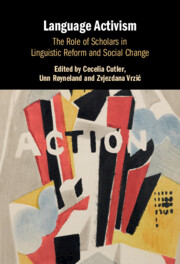Refine search
Actions for selected content:
2 results

Language Activism
- The Role of Scholars in Linguistic Reform and Social Change
-
- Published online:
- 31 May 2025
- Print publication:
- 06 February 2025
1 - Introduction
-
-
- Book:
- Language Activism
- Published online:
- 31 May 2025
- Print publication:
- 06 February 2025, pp 1-12
-
- Chapter
- Export citation
